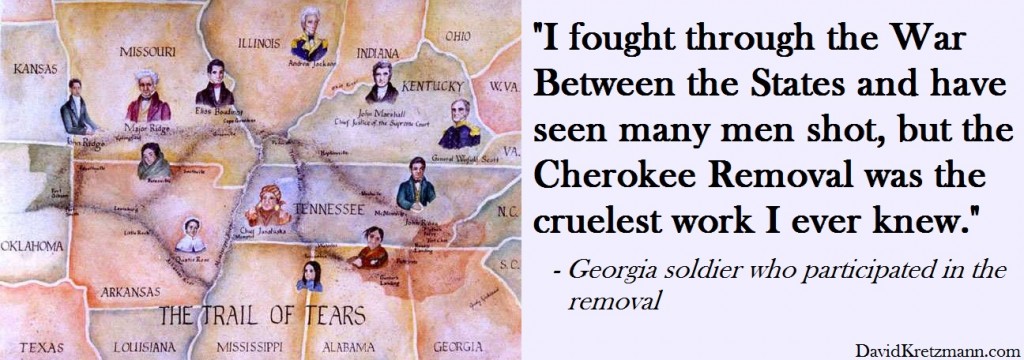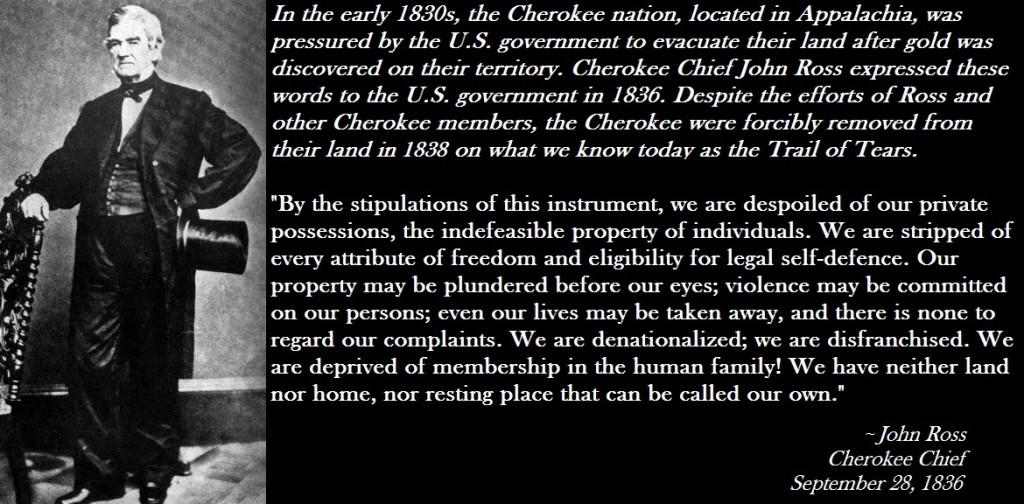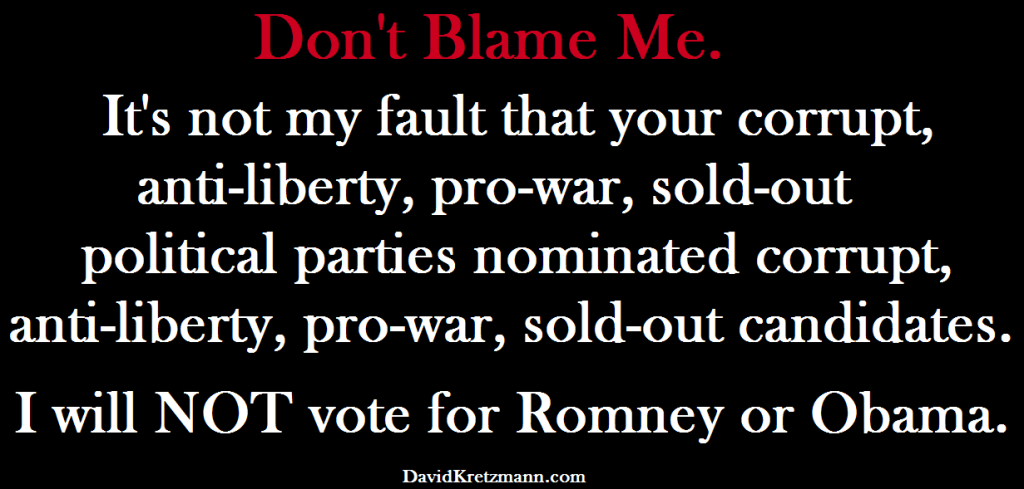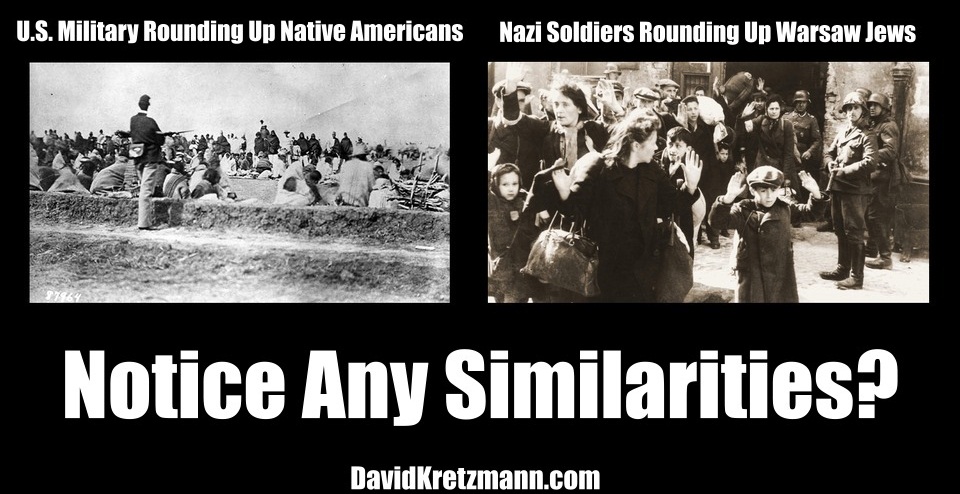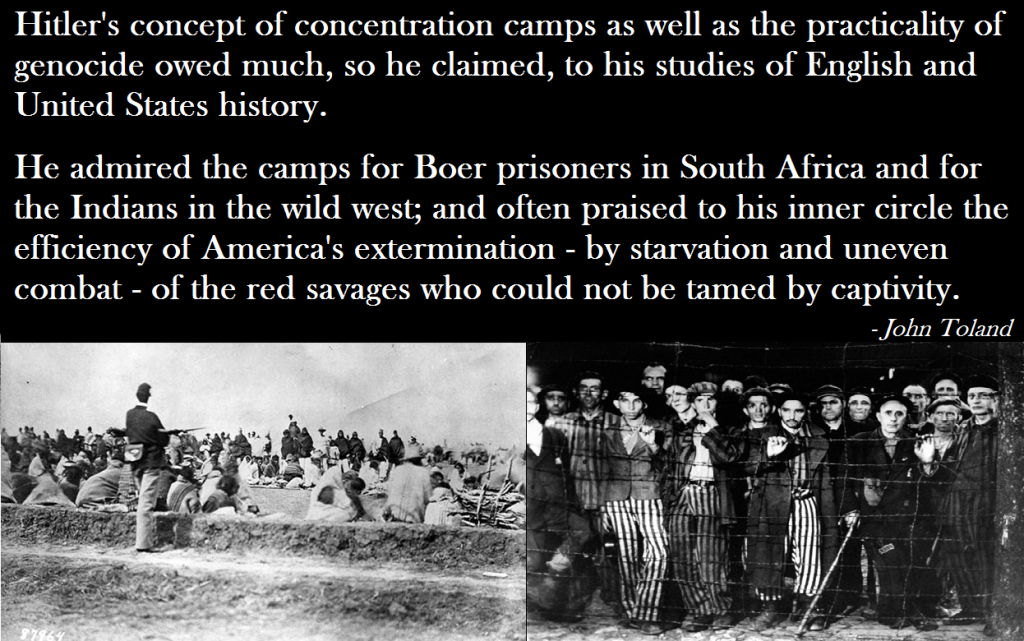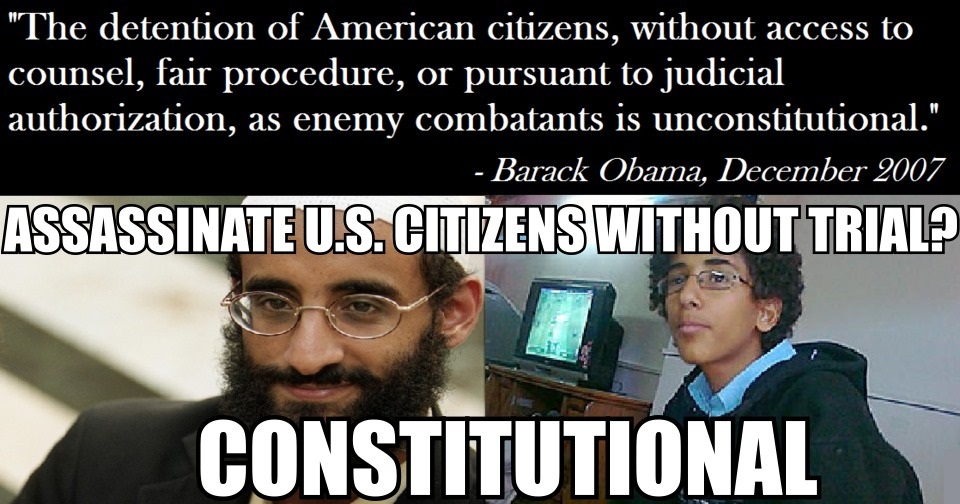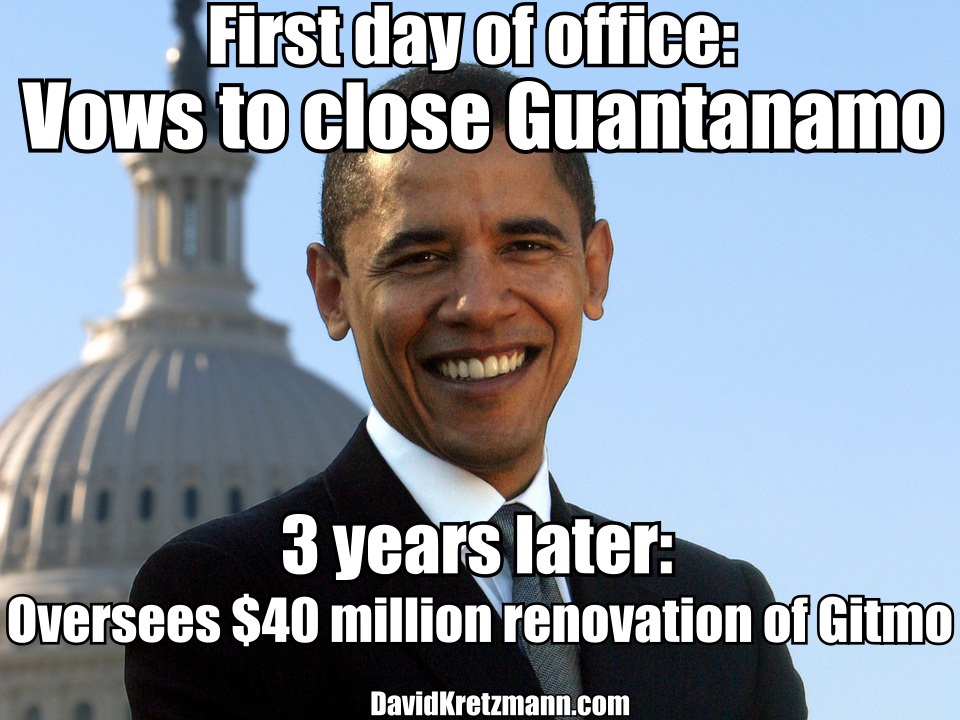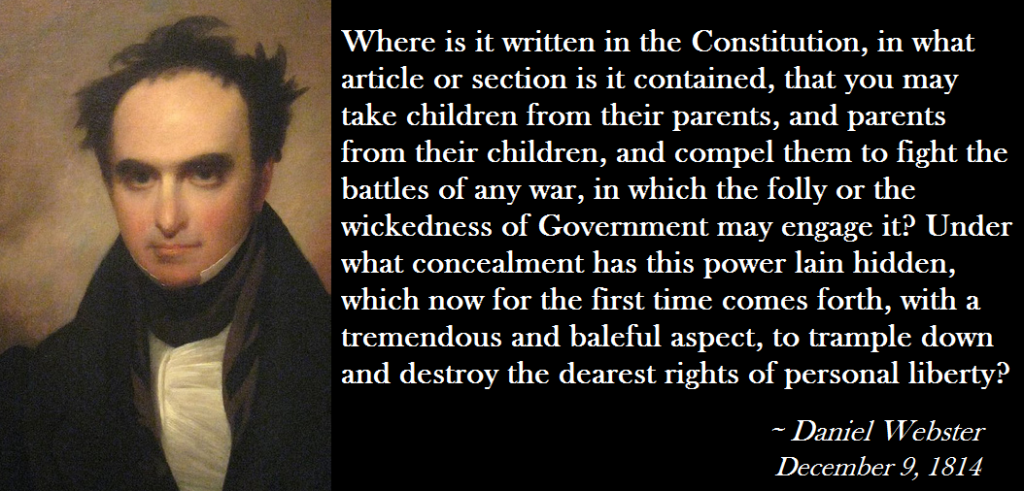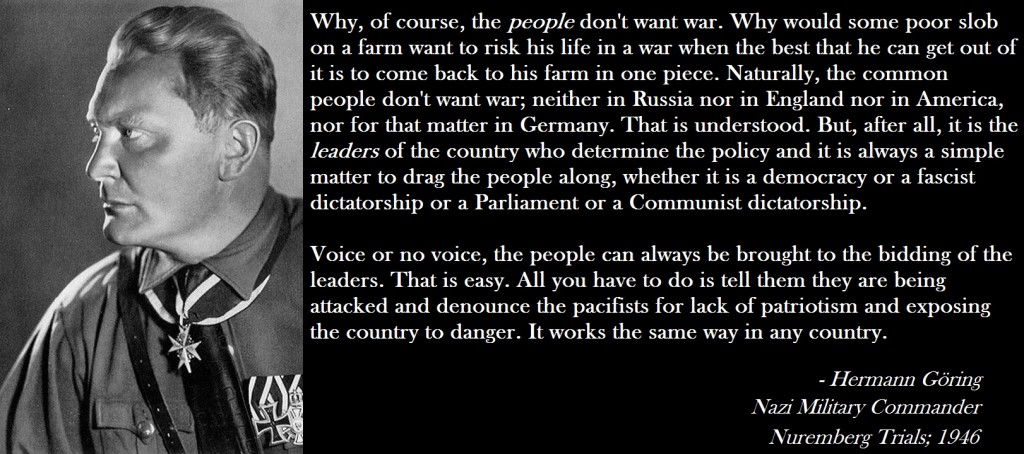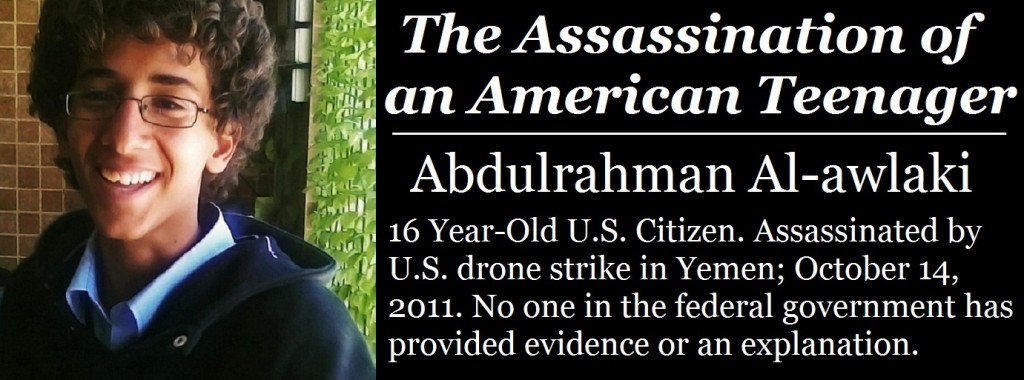A tribute to Tim Kretzmann; my wonderful father, soul friend, and inspiration. I am eternally grateful for the opportunity to share a portion of our lives together on this earth, and will to the best of my abilities continue his legacy of love, boundless joy, and selfless service. Fry free, sweet soul. In Spirit we are always together.
In the early 1830s, the Cherokee nation, located in Appalachia, was pressured by the U.S. government to evacuate their land after gold was discovered on their territory. John Marshall’s Supreme Court ruled in 1831 that the Cherokee were not a sovereign nation and could not hold title to the land on which they lived (despite having lived there for many generations). The U.S. government, only in existence for less than fifty years at the time, conveniently ruled that the Cherokee did not have constitutional protections and could not control their own territory any longer. President Andrew Jackson led the charge to remove and displace the Cherokee and their counterpart tribes that called the region their home.
“John Marshall has made his decision, now let him enforce it! Build a fire under them. When it gets hot enough, they’ll go.” ~ Andrew Jackson
Despite the efforts of Cherokee Chief John Ross and other Cherokee members, the Cherokee were forcibly removed from their land in 1838 on what we know today as the Trail of Tears. Thousands of Cherokee individuals were taken from their homes, without even having time to get their possessions, and marched, surrounded by U.S. soldiers, to concentration camps or “stockades” in Tennessee. The Cherokee were held in these stockades for several months, during which many individuals died of cold, starvation, and disease. Those who survived the stockades were then forced by the U.S. government to march to Oklahoma reservations. It’s estimated that up to a third of the 13,000 Cherokee population died in the Tennessee stockades and march to Oklahoma.
John Ross desperately pleaded for his people and their basic human and legal rights. The Cherokee felt the full brunt of the police state in the 1830s: they were swept from their homes, marched to concentration camps, and then forced to walk hundreds of miles to their new “home” courtesy of the U.S. government. Government is forceful by nature, and the Cherokee learned this harsh fact early on in the U.S. government’s existence.
In Washington D.C., John Ross expressed these words to the U.S. government in 1836 in a final effort to resist the U.S. government which was so desperately trying to displace the Cherokee people.
“By the stipulations of this instrument, we are despoiled of our private possessions, the indefeasible property of individuals. We are stripped of every attribute of freedom and eligibility for legal self-defence. Our property may be plundered before our eyes; violence may be committed on our persons; even our lives may be taken away, and there is none to regard our complaints. We are denationalized; we are disfranchised. We are deprived of membership in the human family! We have neither land nor home, nor resting place that can be called our own.” ~ John Ross; September 28, 1836
People sometimes have a difficult time owning up to the fact that the U.S. government has committed some of the greatest atrocities in known human history. One of the harshest realities that many refuse to even acknowledge is the displacement, slaughter, and internment of thousands of Native Americans at the hand of the U.S. government. The U.S. government declared that Native Americans did not have constitutional protections nor title to the land on which they had lived for generations, far before the U.S. government was even formed.
Perhaps an even harsher reality is how the U.S. government’s treatment in “dealing with” Native Americans built a foundation that would help inspire future tyranny; most notably Adolf Hitler’s methods in rounding up and eradicating millions of Jews in the 20th century, less than 100 years after the U.S. government’s displacement and internment of the remaining Native American population.
“Hitler’s concept of concentration camps as well as the practicality of genocide owed much, so he claimed, to his studies of English and United States history. He admired the camps for Boer prisoners in South Africa and for the Indians in the wild west; and often praised to his inner circle the efficiency of America’s extermination – by starvation and uneven combat – of the red savages who could not be tamed by captivity.” ~ John Toland
Moral reasons alone should be enough to convince anyone that a military draft, no matter what the excuses, is the antithesis of individual liberty and human freedom. That notwithstanding, this Daniel Webster quote from 1814 (in the midst of the War of 1812) ought to dismantle any potential argument that states the Constitution somehow allows for the government to force individuals to participate in their military adventures. Someone should tell this to General Stanley McChrystal, the head U.S. general in Afghanistan, who just this month said, “I think we ought to have a draft.”
“Is this, Sir, consistent with the character of a free Government? Is this civil liberty? Is this the real character of our Constitution? No, Sir, indeed it is not. The Constitution is libeled, foully libeled. The people of this country have not established for themselves such a fabric of despotism. They have not purchased at a vast expense of their own treasure and their own blood a Magna Carta to be slaves. Where is it written in the Constitution, in what article or section is it contained, that you may take children from their parents, and parents from their children, and compel them to fight the battles of any war, in which the folly or the wickedness of Government may engage it? Under what concealment has this power lain hidden, which now for the first time comes forth, with a tremendous and baleful aspect, to trample down and destroy the dearest rights of personal liberty? Sir, I almost disdain to go to quotations and references to prove that such an abominable doctrine has no foundation in the Constitution of the country. It is enough to know that that instrument was intended as the basis of a free Government, and that the power contended for is incompatible with any notion of personal liberty. An attempt to maintain this doctrine upon the provisions of the Constitution is an exercise of perverse ingenuity to extract slavery from the substance of a free Government. It is an attempt to show, by proof and argument, that we ourselves are subjects of despotism, and that we have a right to chains and bondage, firmly secured to us and our children, by the provisions of our Government.
The supporters of the measures before us act on the principle that it is their task to raise arbitrary powers, by construction, out of a plain written charter of National Liberty. It is their pleasing duty to free us of the delusion, which we have fondly cherished, that we are the subjects of a mild, free and limited Government, and to demonstrate by a regular chain of premises and conclusions, that Government possesses over us a power more tyrannical, more arbitrary, more dangerous, more allied to blood and murder, more full of every form of mischief, more productive of every sort and degree of misery, than has been exercised by any civilized Government in modern times.” ~ Daniel Webster; December 9, 1814. (Full speech)
Hermann Göring was one of the founders of the Gestapo in 1930′s Germany, and was a leading military commander of the Nazi’s air forces leading up to and during the beginning of World War II. In addition, Göring was essentially Hitler’s successor and second-in-command for the majority of Hitler’s reign as Chancellor. This telling quote from Göring came during a discussion from Gustave Gilbert in the midst of the Nuremberg Trials; Gilbert maintained a journal of his observations and discussions at the Trials. As reported by Snopes:
The quote offered above was part of a conversation Gilbert held with a dejected Hermann Goering in his cell on the evening of 18 April1946, as the trials were halted for a three-day Easter recess:
Sweating in his cell in the evening, Goering was defensive and deflated and not very happy over the turn the trial was taking. He said that he had no control over the actions or the defense of the others, and that he had never been anti-Semitic himself, had not believed these atrocities, and that several Jews had offered to testify in his behalf. If [Hans] Frank [Governor-General of occupied Poland] had known about atrocities in 1943, he should have come to him and he would have tried to do something about it. He might not have had enough power to change things in 1943, but if somebody had come to him in 1941 or 1942 he could have forced a showdown. (I still did not have the desire at this point to tell him what [SS General Otto] Ohlendorf had said to this: that Goering had been written off as an effective “moderating” influence, because of his drug addiction and corruption.) I pointed out that with his “temperamental utterances,” such as preferring the killing of200 Jewsto the destruction of property, he had hardly set himself up as champion of minority rights. Goering protested that too much weight was being put on these temperamental utterances. Furthermore, he made it clear that he was not defending or glorifying Hitler.Later in the conversation, Gilbert recorded Goering’s observations that the common people can always be manipulated into supporting and fighting wars by their political leaders:
We got around to the subject of war again and I said that, contrary to his attitude, I did not think that the common people are very thankful for leaders who bring them war and destruction.
“Why, of course, the people don’t want war,” Goering shrugged. “Why would some poor slob on a farm want to risk his life in a war when the best that he can get out of it is to come back to his farm in one piece. Naturally, the common people don’t want war; neither in Russia nor in England nor in America, nor for that matter in Germany. That is understood. But, after all, it is the leaders of the country who determine the policy and it is always a simple matter to drag the people along, whether it is a democracy or a fascist dictatorship or a Parliament or a Communist dictatorship.”
“There is one difference,” I pointed out. “In a democracy the people have some say in the matter through their elected representatives, and in the United States only Congress can declare wars.”
“Oh, that is all well and good, but, voice or no voice, the people can always be brought to the bidding of the leaders. That is easy. All you have to do is tell them they are being attacked and denounce the pacifists for lack of patriotism and exposing the country to danger. It works the same way in any country.”
How was Abdulrahman’s targeted assassination initially reported in the media? Some quotes that sound very familiar with the usual semantics of all media coverage on drones and suspects:
“Yemeni officials told reporters that nine members of Al Qaeda in the Arabian Peninsula were killed in the strike near the town of Azzan in southeastern Yemen, including Awlaki’s 21-year-old son…” – LA Times, October 15, 2011
“Report: Al-Awlaki’s son among dead in U.S. airstrike on Yemen al-Qaida militants” – headline from Haaretz, October 15, 2011
“Official: Drone attack kills Al-Awlaki’s son in Yemen… The attacks, carried out in the Shabwa district, killed seven suspected militants, the defense ministry said.” – CNN, October 15, 2011
“Awlaki’s son is also among the 24 militants killed in air strikes targeting al-Qaeda in Yemen, local officials said.” – Al Arabiya News, October 15, 2011
“Three drone attacks in Yemen Friday night killed seven suspected militants including Anwar Al-Awlaki’s son, a security official said. Carried out in the Shabwa district, where the younger Awlaki had been holed up for more than eight months” – Business Insider, October 15, 2011
“U.S. drone strike in Yemen kills nine jihadis, including Awlaki’s son” – Hot Air, October 15, 2011
Lie #1: Abdulrahman is a 16 year old American teenager, not a 21 year old militant.
Lie #2: U.S. claimed al-Banna was the actual target. The problem with that excuse is that al-Banna is alive and well, and was never at that site. Since that revelation, the Obama Admin. simply states there is no official record of the death of Abdulrahman, and sweeps the story under the carpet so it doesn’t even have to take accountability that the crime even happened.
Lie #3: The media says Abdulrahman was hiding in the mountains for months. Actually, he left his home a couple weeks before to find out about his father, and even during that time he was living and moving around in the open, far from hiding.
It seems that being a suspected militant is enough to make you a viable target. And the criteria for determining what makes you a suspect is easily adjustable to their convenience it seems.
Barack Obama: the first U.S. president to use targeted assassination against a child.
Taken from: Abdulrahman Anwar Alawlaki – A crime we’ll never forget
Why no one can (or should) ignore the assassinations of Abdulrahman and his father, Anwar Al-awlaki:


